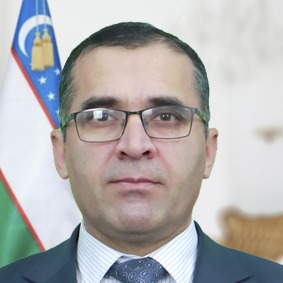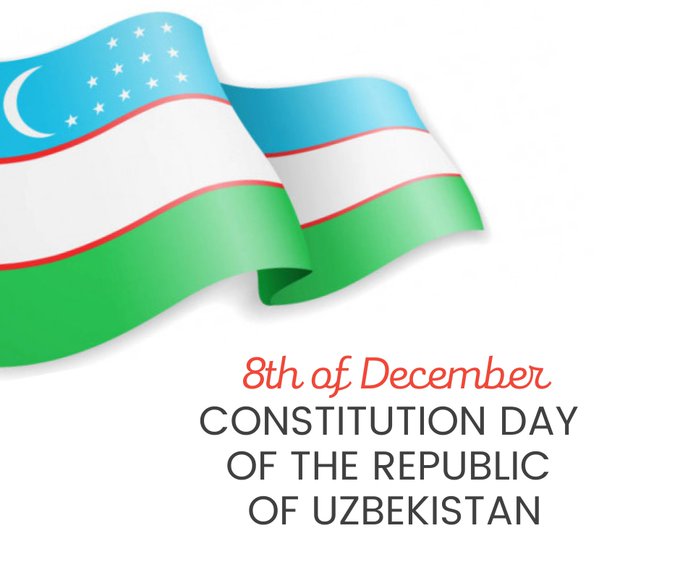On December 8, Uzbekistan celebrates the 31st anniversary of the adoption of the Constitution. The new edition of the Constitution of the Republic of Uzbekistan was adopted in a referendum held on April 30, 2023. In the Constitution of the Republic of Uzbekistan, the main rules related to foreign policy are reflected in Articles 15, 17 and 18. The new norms and rules have cemented the constitutional backbone of the consistent and sustainable foreign policy of the country, writes Qodir Djuraev.
In particular, in accordance with Article 15, the international treaties of the Republic of Uzbekistan are afforded new strength as a component of the normative system of the country along with the generally recognised principles and norms of international law. For instance, if an international agreement of the country stipulates rules different from those in the national law, the rules of the international agreement take priority in application.
This norm was introduced in line with requirements of the current Law of the Republic of Uzbekistan on Regulatory and Legal Documents, as well as foreign experience. The designation of international treaties to which the country is part as an integral element of the national normative system is important in ensuring the direct application of the norms these documents envisage. In particular, courts, law enforcement agencies and other government bodies, as well as citizens organize their activities directly relying on the norms of international agreements.
The above norm is fully consistent with the international constitutional experience and has been enshrined in the basic laws of a number of nations. The constitutional practice of countries like France, Germany, Spain, Slovenia maintains that universally recognized principles and norms of international law are a component of the national legal system.
Set forth in Uzbekistan’s Constitution, the concept of the priority of rules of international agreements is derivative of the principle of international law “Pacta sunt servanda”, meaning that agreements must be fulfilled.
This idea, in turn, is reinforced in the UN Charter and the Vienna Convention on the Law of Treaties, according to which states must conscientiously deliver their obligations under international deals. International treaties are agreements between or among various subjects of international law, in particular, states, aimed at defining mutual rights and obligations in their agreements in political, trade-economic, cultural-humanitarian or other fields. Pacts are divided into bilateral and multilateral.
In turn, there are open and closed types of multilateral agreements. Third parties may join an open international agreement, while only with the consent of participants may other countries join a closed international pact.
The titles of international agreements are also diverse and they can be named treaties, agreements, conventions, pacts, declarations, memorandums, statutes, protocols, charters, among others.
International agreements may be extended or terminated by denunciation upon mutual agreement of the parties.
Since it gained independence, Uzbekistan has joined more than 4,000 various international agreements as an equal member of the international community. The Law on International Agreements of the Republic of Uzbekistan was adopted in 1995 and revised in 2019.
To be sure, consolidation of the international agreements of Uzbekistan as a component of the national legal system at the constitutional level serves to show, on the one hand, that the country will always be faithful to the international obligations it has assumed, as a reliable partner at the international arena, and on the other hand, that the rights and freedoms of citizens are protected not only by the national legislation, but also on the basis of international law.
The norms enshrined in Article 17 of the Basic Law state that the Republic of Uzbekistan is a full-fledged subject of international relations, its foreign policy is built on universally recognized norms and principles of international law, and they are listed one by one. In particular, it stipulates that its foreign policy is based on the principles of sovereign equality of states, non-use of force or threat of force, non-violation of borders, territorial integrity of states, peaceful resolution of disputes, non-interference in the internal affairs of other countries, among other universally recognized principles and norms of international law.
This article affirms that Uzbekistan conducts a friendly and peace-loving foreign policy with all countries, as well as respects the norms of international law and adheres to them without deviation.
The country’s foreign policy has developed consistently over the past years on the basis of these essential norms. Uzbekistan’s participation in regional and international processes has increased significantly. It is being recognized by the international community for its progressive and amicable foreign policy.
The universally recognized norms and principles of international law derive from the obligations of a number of international agreements signed by Uzbekistan. They are reflected in the founding documents, statutes and other international documents of international and interstate organizations. So far, more than ten norms and principles have been developed by the international community, while the UN Charter (1945), the Universal Declaration of Human Rights (1948), the Declaration on Principles of International Law (1970), the Final Act of the Conference for Security and Cooperation in Europe (1975) can be cited as their main sources.
In the latest national referendum in Uzbekistan on 30 April, 2023, Article 17 of the Constitution was supplemented with another important principle of international law, which is the principle of territorial integrity of states. It prohibits the use or threat of force against the territorial integrity and political independence of any state. This concept emerged in international legal practice with the adoption of the UN Charter and was reflected in the Universal Declaration of Human Rights, International Covenants on Civil and Political Rights, Economic, Social and Cultural Rights and other founding documents.
This principle was later fully expressed in the Final Act of the Conference for Security and Cooperation in Europe in 1975, which states: “The participating States will respect the territorial integrity of each of the participating States. Accordingly, they will refrain from any action inconsistent with the purposes and principles of the Charter of the United Nations against the territorial integrity, political independence or the unity of any participating State, and in particular from any such action constituting a threat or use of force. The participating States will likewise refrain from making each other’s territory the object of military occupation or other direct or indirect measures of force in contravention of international law, or the object of acquisition by means of such measures or the threat of them. No such occupation or acquisition will be recognized as legal.”
Another article of the Constitution related to the foreign policy of Uzbekistan is Article 18, which reads:
“Article 18. The Republic of Uzbekistan implements a progressive peaceful foreign policy aimed at the comprehensive development of bilateral and multilateral relations with countries and international organizations.
The Republic of Uzbekistan may establish alliances, enter and leave commonwealths and other interstate bodies building on the highest interests of the state, the people, its well-being and security.”
This article is critical in that it seeks to boost the image, role and reputation of Uzbekistan in the international arena, establish a sustainable system of strategic cooperation and friendship relations with all countries and international organisations, and develop friendly, equal relations and mutually beneficial cooperation with foreign nations.
This article is also crucial for Uzbekistan’s foreign policy. On the one hand, it fully corresponds to the current moderate, consistent, progressive, constructive and peace-loving foreign policy of the country. On the other hand, it clearly embodies Uzbekistan’s openness to the world, that it is a nation with predictable actions, and that it is always willing for cooperation with distant and nearby countries. This norm allows to preserve and bolster the achievements made in recent years in relations with international partners.
To cite just one example, owing to Uzbekistan’s consistent and pragmatic regional policy over recent years, a new atmosphere of mutual trust and respect, friendship and close cooperation has emerged in Central Asia. Good neighborliness and strategic partnership, even at the level of alliance relations, are being consolidated. Experts have rightly dubbed the positive changes underway in the region the ‘Spirit of Central Asia’.
The norms cited with regard to the foreign policy of Uzbekistan, enshrined in the new edition of the national Constitution, serve to establish a new approach to international relations and the implementation of effective foreign political activities and, without any doubt, allows for the development of a prudent active, open, pragmatic foreign policy that meets the national interests and aims to enhance ties with foreign countries near and far abroad.

The Author, Qodir Djuraev, is the Deputy Chairman of the Committee on International Affairs and Interparliamentary Relations of the Legislative Chamber of the Oliy Majlis of the Republic of Uzbekistan




